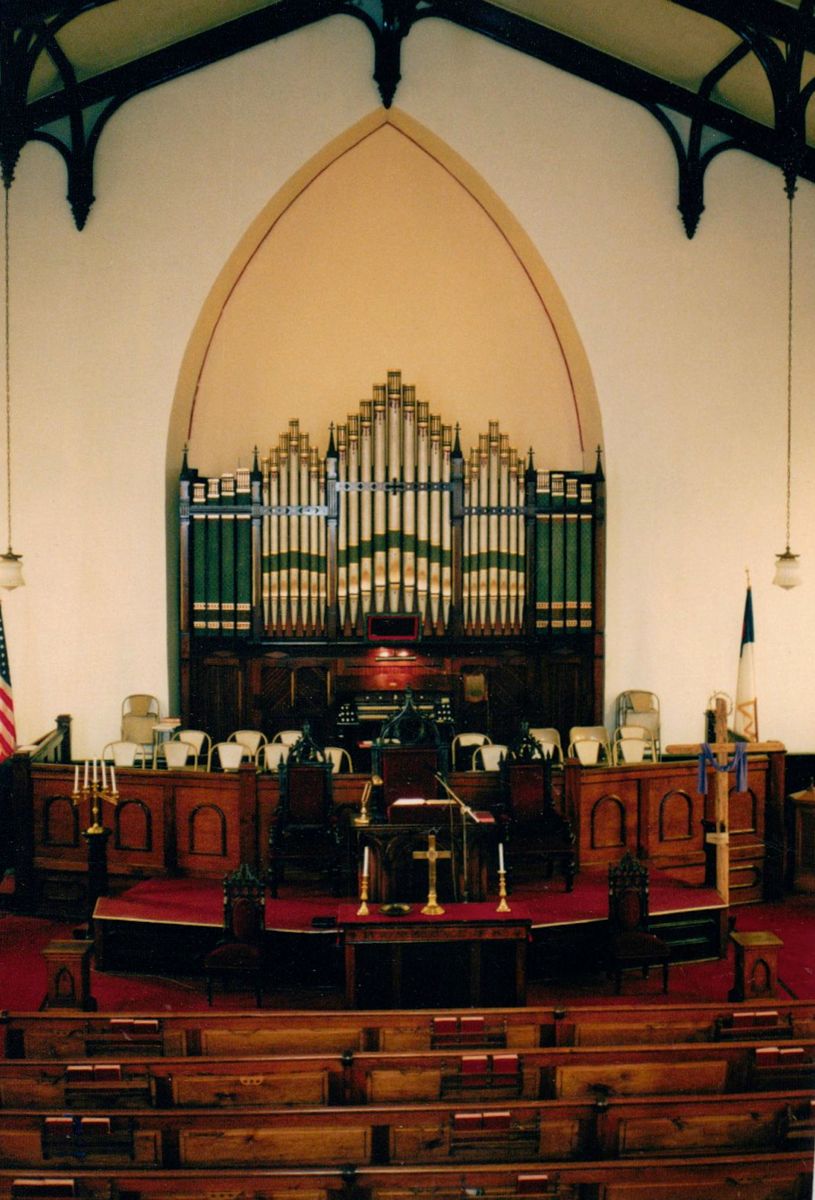
2007-07-25 - Sanctuary Interior, Chancel, and Pipe Facade (Photograph by Linda P. Fulton/Database Manager)

2009-02-21 - Updated through online information from Linda P. Fulton. -- There are two mechanical combination pedals. The left hand one puts on the "soft" Great stops, while the right hand one adds the diapason chorus. -Database Manager
2009-02-23 - Updated through online information from Linda P. Fulton. -- An interesting fact about this organ: the church acquired it by chance. It was originally built for a church in Charleston, SC and was on a flatboat on the Ohio River, on its way to Charleston. The boat captain received word that the church in Charleston did not want the organ and happened to be in the vicinity of Ripley. He asked if any church in Ripley wanted the organ and the Presbyterians accepted it. The reason the church in Charleston did not want the organ was likely the earthquake of August 31, 1886, which did a considerable amount of damage in Charleston. Long-time church members related the story to me of how the church acquired the organ, but no one ever mentioned exactly why. I read an article in a geological journal, <i>Earth</i> (Jan. 2009), which mentioned the earthquake and am putting "two and two together." Also, there was an article about this church entitled "Small Town Choir" in the May 11, 1942 issue of <i>Life</i> magazine. There are several photos which show the organ. -Database Manager
2017-01-22 - Updated by J. A. Hefner <br>The organ [and its clacking action] can be heard here:<br>https://www.youtube.com/watch?v=icVF7ykeXoA<br>https://www.youtube.com/watch?v=veninRr9e_E<br>The first video is an interesting listen as I hear certain pipe voices that are also audible in the 1942 Schantz at High Str. UMC...likely the pipes reused from the 1881 Felgemaker. -Database Manager
Stoplist from console, originally 2001, updated to 2013 Source: Source not recorded Date not recorded
Ripley, Ohio (rev. 01/04/13) First Presbyterian Church Specification of the organ A. B. Felgemaker & Co., Erie, PA, builders, 1886, Opus 472 12 ranks; 662 pipes Manual compass, 61 notes Pedal compass, 27 notes Great Open Diapason 8’ 61 pipes Melodia 8’ 49 (t.c.) Dulciana 8’ 49 (t.c.) Unison Bass 8’ 12* Octave 4’ 61 Twelfth 2 2/3’ 61 Fifteenth 2’ 61 (*Provides lowest octave for Melodia and Dulciana) Swell Open Diapason 8’ 49 (t.c.) Stopped Diapason 8’ 49 (t.c.) Stopped Diapason Bass 8’ 12** Gamba 8’ 49 (t.c.) Aeolina 8’ 61 Flute Harmonique 4’ 61 (**Provides lowest octave for Open and Stopped Diapason and Gamba) Pedale (original spelling) Bourdon 16’ 27 Couplers: Great to Pedale Swell to Pedale Swell to Great Accessories: Tremolo Balanced swell pedal (operates shutters of swell box through mechanical linkage) Two fixed combination pedals to Great Chimes (later addition, with electro-pneumatic action; it is believed that the stop knob used for the chimes was originally used for a bell to call the organ pumper. Oddly enough, the ivory disc in this knob reads “Chines”.) The organ was originally hand-pumped, but has had an electric blower added. The organ received some fairly extensive restoration work in 2009, carried out by J. Zamberlan & Company of Wintersville, Ohio. A new blower is being installed January, 2013. [Received from Richard M. Watson 2013-01-05.]
Regrettably, it is not possible to display the information about the sponsor of this pipeorgandatabase entry or if there is a sponsor. Please see About Sponsors on Pipe Organ Database.